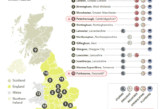Jamie Penny, National Business Development Manager at Intergas Heating Solutions, discusses the benefits of hybrid heating systems.
There are 2.7 million homes in England owned by housing associations and, while the Government’s £1.4bn fund to help decarbonise existing social housing properties has been welcomed by the industry, it’s only available for two years and it’s not nearly enough.
According to research conducted by the National Housing Federation, the cost of decarbonising these homes is around £36bn. On the plus side, properties in the social rented sector are some of the most energy-efficient in the country: in 2019 social rented properties were more likely to be in the highest Energy Efficiency Rating (EER) bands of A to C (61%) compared with private rented (38%) and owner occupied (36%) properties (source: English Housing Survey Energy report, 2019-20).
Much of this is down to getting the basics right: insulation, ventilation and energy-efficient boilers. For some years now housing associations have been reviewing their options, with many installing electric boilers in their new-build and, more recently, replacing gas boilers with heat pumps. But as electricity is still around three times more expensive per kilowatt hour than gas, and with the cost-of-living crisis continuing to affect disposable income, going all-electric could be hard on residents’ wallets and on housing associations’ budgets.
If the heat pump route is just too expensive to consider at scale, there’s always the hybrid heating system. Hybrid technology is not new. This is where a boiler, usually a gas combi, is linked to an indoor control unit and an air source heat pump (ASHP). The heat pump heats the home, and the boiler provides the hot water, which together deliver a reduction in gas consumption of at least 70%. From tests on our own hybrid heating system, Xtend, gas consumption can be cut by up to 82.5%.
Cost-cutting, time-saving installation
It’s not just gas consumption that’s reduced, installation costs will be far lower. With a hybrid you have the cost of a heat pump and an indoor control unit, but if the existing boiler is an ErP combi you may not need to change it and the heat pump could be retrofitted to the system with just a minor pipework alteration to the boiler. There’s no need to change the radiators either, providing the heat loss calculation has been done and they’ve been sized and flushed correctly, but you may have to upsize them all if a stand-alone heat pump were replacing the boiler.
As the flow temperatures of the heat pump are so low, around 35-50˚C (a traditional boiler system operates at around 70-80˚C), the radiators need a larger surface area to provide the required heat demand. A heat pump can’t heat the water as a combi does, so a separate hot water storage cylinder will need to be installed. And, by using a predetermined Coefficient of Performance (CoP) set point, residents will benefit from the most cost-effective combination of energy to heat the property. Cost- and time-savings aside, the disruption to the household is vastly reduced too.
What about the comfort levels?
Much has been written about the heat pump leaving you feeling a little cold, and this is due to the low flow temperatures we’ve just covered, but if the property is well insulated, it should provide all the heat that’s needed. If the insulation isn’t sufficient, then the hybrid heating system will always provide the comfort residents are used to because the gas boiler can always supplement the heat requirement when necessary.
Where next?
We’re all aware that domestic heating accounts for 14% of UK carbon emissions and that this has to be tackled now, but positioning the stand-alone heat pump as the panacea for carbon emissions reduction isn’t the solution. Given the other energy-saving technologies like the solar panel and the variable standards of insulation, the heat pump is only part of the solution. For cost-effective heating and hot water that won’t cost the earth, hybrids work.
More information on Intergas’ hybrid heating system, Xtend range here.
Header image: Intergas Heating Solutions’ hybrid heating system Xtend










